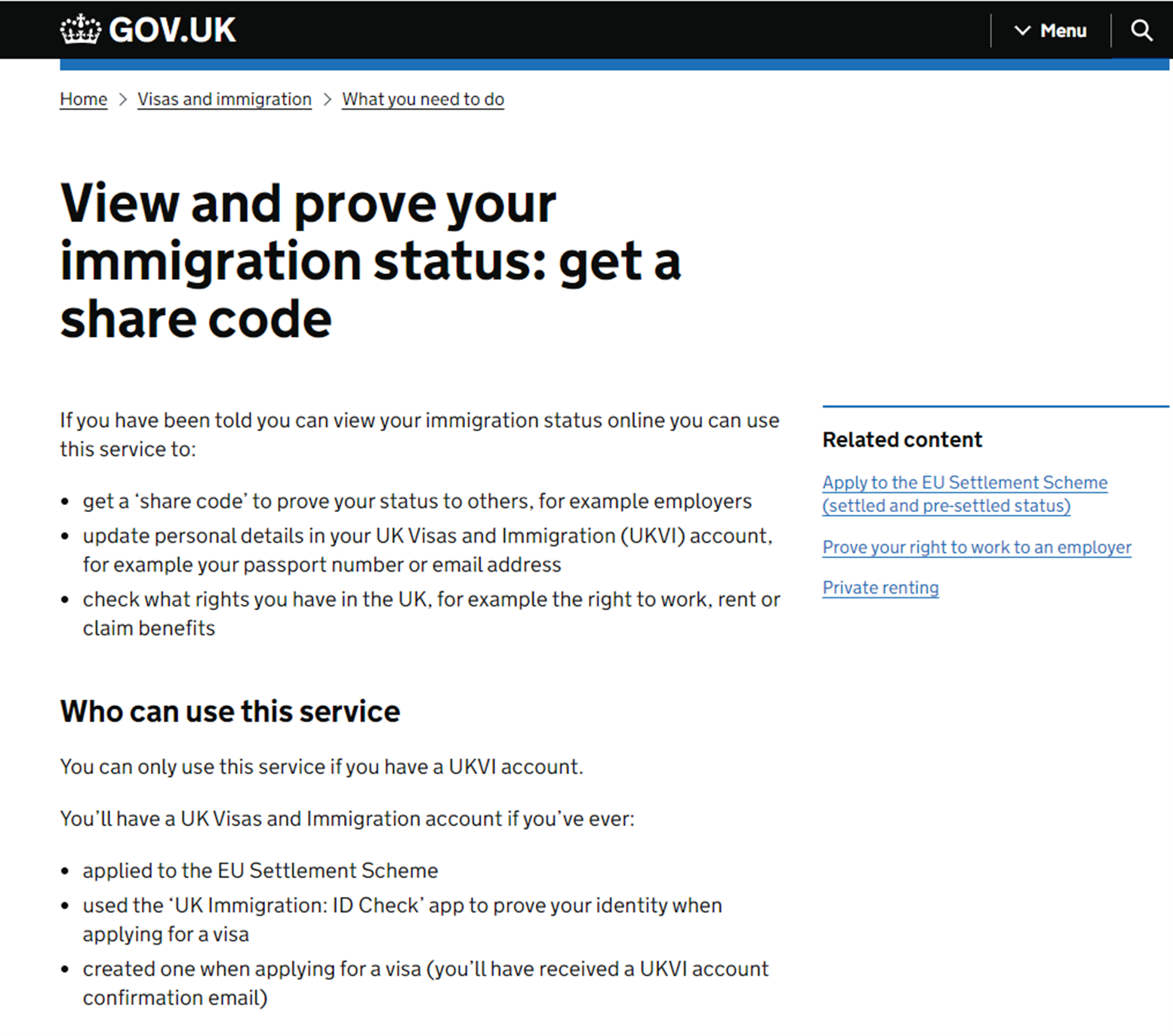EU Rights and Brexit Hub response to inquiry into the Effects of UK Immigration Policy on Poverty
Professor Charlotte O'Brien
Charlotte O’Brien and Alice Welsh submitted the following response to the Professional Experience questionnaire for the APPG on Migration and the APPG on Poverty’s joint inquiry into The Effects of UK Immigration, Asylum and Refugee Policy on Poverty on 1st November 2023.
The EU Rights & Brexit Hub is a legal action research project. We give specialist, second tier advice on EEA nationals’ (and their family members’) rights to access public services, including welfare benefits, on cases referred by advice organisations around the four nations of the UK. We compile evidence of the problems encountered into an advice-led ethnography.
Dr Alice Welsh
From your experience do those in migrant communities struggle with their financial income and what specific policies contribute to this?
Yes. The exclusion of pre-settled status from the categories of right to reside that count for the purposes of the habitual residence test, creates significant hardship for the majority of clients we see. It is disproportionate and without a clear policy aim, as those individuals will in due course be entitled to settled status and full equal treatment rights anyway.
The rights of people with pre-settled status
The exclusion of pre-settled status combined with a failure to adequately consider other possible rights to reside leads to many benefit rejections; incorrect decisions that do not consider permanent residence, or do not properly assess periods of work and/or retained worker status. Much of our casework involves challenging benefits refusals where a decision maker has not adequately considered a possible right of residence or has applied the rules relating to those rights of residence incorrectly.
Additionally, the Upper Tribunal ruled in December 2022 that people with pre-settled status are entitled to protection from the Charter of Fundamental Rights, via the Withdrawal Agreement, so that Universal Credit decisions should take account of, inter alia, the right to dignity. This case, SSWP v AT [2022] UKUT 330 (AAC), was referred to the Court of Appeal, and judgment will be handed down on the 8th November. However, we expect that the judgment will be appealed to the Supreme Court, and may be the subject of a reference to the CJEU, all of which will result in a long delay before the question is finally resolved. DWP have stayed a large number of cases behind AT, including cases in which the DWP has exercised stays inappropriately – some examples follow:
Case study A: Failure to consider permanent residence rights
Client was an EEA national with pre-settled status and had lived in the UK since 2019. He was working as a courier and after an accident at work in 2021 resulted in a permanent disability he was not able to work anymore. The client’s circumstances should have been investigated to find out if he had acquired a permanent right of residence as a worker who has ceased activity (Regulation 5(3)) under Regulation 15(1)(c). No investigation into these circumstances were made and the client’s application for Universal Credit was stayed due the pending judgment in SSWP v AT.
Those who have pre-settled status and a qualifying right of residence face significant delays when trying to access Universal Credit, if their case is stayed instead of being assessed as it should be. This could be an infringement of their right to be protected from discrimination based on nationality and equal treatment under Article’s 12 and 23 WA.
Case study B: Staying cases which are not bound by AT
Client had pre-settled status and applied for Universal Credit in June 2020, before the end of the transition period. He was awarded Universal Credit during the Covid-19 pandemic and over a year later was told that he was not entitled and would be required to pay back £16,000. The client in this case decided to challenge the decision that he was not entitled to Universal Credit. However, in response to the client’s request for a mandatory reconsideration, DWP decided to stay the case due to SSWP v AT.
In this case the stay should never have been made. The facts occurred before the end of the transition period, meaning that the CJEU decision in Case C-709/20 CG should have been applied as the client was still protected by the EU treaties at the time.
Case study C: Blanket refusal to engage with none-AT facts
The client was seeking to challenge a refusal to Universal Credit and put evidence together that she had a right of residence as a worker. DWP informed the client that “All HRT MR’s for claimants with pre settled status are on hold due to a pending upper tribunal court case, similar to the Fratila judgement. We cannot take any further action on this case until the outcome of the upper tribunal case is known. All cases are being put into a holding queue awaiting the outcome.”
We further note that it is disappointing that SSWP seeks to argue that the government should not be obliged to respect the human right to dignity when considering applications to Universal Credit. We suggest that regardless of the status of the Charter of Fundamental Rights of the EU, the government should give effect to the right to dignity, and consider whether refusals of Universal Credit would lead to an infringement of that right, considering whether claimants have access to essentials, such as food, clothing, housing and utilities.
The rights of durable partners of EU nationals
DWP’s policy of not considering EU nationals’ durable partners to be extended family members unless they possess a specific family member residence certificate also contributes to poverty of EU national families. It is a problematic policy because, if the durable partner is an EU national themselves, they had no need of such a certificate until after the end of the grace period (30th June 2021), at the point at which it became necessary is also the point at which the Home Office closed applications for them. So they are expected to discharge a condition which it is now impossible to discharge, regardless of the person otherwise meeting all the substantive criteria of being an extended family member. They can have residence rights, having applied to the EUSS in their own right, but are denied status as family members of EU national workers, and so are disqualified for a range of subsistence benefits.
Case study D: Universal Credit reduced for Couple with 3 young children due to no EEA family member permit
Client is a Romanian national, she moved to the UK in 2020 with her Italian national partner. Together they have 3 children who are all under school age. After the client's partner lost his job, they applied for Universal Credit. This was awarded on the basis that her partner had rights as someone who had retained worker status. However, because the client was not married to her partner, and did not have an EEA family permit, she was found to not be eligible for Universal Credit. As a result, the couple received only the amount for a single person, rather than a couple. They have also been impacted by the two-child rule for Universal Credit.
We have three further examples of similar cases, all with durable partners not recognised as such, resulting in UC at the single rate.
Is the economic support available from the government adequate for those in migrant communities to support themselves and their families? If possible, please provide evidence.
No. For people discussed in the section above – EU nationals with pre-settled status, but (often incorrectly) found not to have another qualifying right to reside, there is currently no
Specific economic support. While migrants with a No Recourse to Public Funds condition attached to their residence rights can apply to have the NRPF condition waived, it is not currently possible to have the right to reside condition aspect of the habitual residence test waived for EU nationals on human rights grounds.
As a result, some of the individuals and families in question face destitution – making SSWP’s exercise of the power to stay decisions in those cases even less appropriate. This has particularly acute impact on women who suffer domestic abuse, and on children.
Case study E: Mother and baby in poverty following domestic abuse
A non-EEA national with pre-settled status, has a 9 month old baby. She is married to an EEA national who subjected her to domestic abuse. After the abuse was reported to the police, the EEA national husband left the UK and initiated divorce proceedings. Client applied for Universal Credit but this was refused as the client had no right of residence beyond pre-settled status. Her only income comes from section 17 support - this is discretionary and could be revoked at any time. Through this she is in s.17 accommodation and receives just £400 a month.
Case study F: Failure to recognise right to reside after accident at work
Client had pre-settled status and was working in the UK as a driver. He had a motorbike accident while working, sustaining a number of injuries and having to stop work. R claimed disability benefits and was in supported housing provided by the local authority. Suddenly the local authority contacted the client to say that he was not entitled to housing support from them. He was at risk of being made street homeless. We were contacted by his support worker to help challenge this decision as the local authority had stated that the rules for EEA nationals only applied to benefits and not to housing. The decision was overturned after the adviser used our advice to challenge the decision.
In relation to the last question, please explain which policies affect those in migrant communities access to public services and how.
Social welfare
The right to reside element of the habitual residence test excludes some of the most vulnerable EU nationals and their family members from support.
The two child limit in Universal Credit and Child Tax Credit has a sweeping, damaging effect on all communities in the UK, but disproportionately affects migrant families for two reasons – first, they are more likely to have three or more children so are more likely to be hit by the limit; and second, they are more at risk of poverty, so when they are hit by the limit, the effects are more likely to be acute. The effect of excluding children from the subsistence calculation of a family is amplified when, for example, as a result of the right to reside test one of the adults is also excluded.
Delays in EUSS decision making also create obstacles to accessing social welfare, leading in turn to hardship:
Case study G: 15 month EUSS wait led to mother and children relying on charities and foodbanks
Client, a non-EEA national mother and her children waited 15 months for an outcome of an application to the EUSS. She had lived in the UK for 7 years when she applied for status. Her application for Universal Credit was refused as she could not establish a right to reside without access to her EEA husbands’ work history. Instead, she had to wait until her EUSS application was decided, and she was granted settled status. During this time, she had to rely on charities and foodbanks. By the time her application for settled status was decided she had missed out on over 13 months of Universal Credit payments. The length of delay in this case was unreasonable and caused significant hardship to the family affected.
Case study H: Client entitled to settled status but Home Office took 2 years to award it
Client applied for the EUSS before the 30 June 2021 deadline; he waited 2 years for a decision but was awarded settled status in August 2023. Client had applied for Universal Credit in 2021 but was found not to have an additional qualifying right to reside. His benefits adviser contacted us to ask if it is possible to challenge the old Universal Credit decision on the basis that the Home Office took too long to decide that the client had settled status. The old Universal Credit refusal is being challenged but the client has missed out on over 2 years of Universal Credit payments.
Case study I: Pending application for over 3 years; failure to consider self-sufficiency
Client lived in the UK from the age of 14. He went to school in the UK and lived here for over 10 years working in a variety of different jobs. He made an EUSS application in July 2020. He still has not had a decision on this over 3 years later. The Home Office Resolution Centre has informed the client that his application is on hold as he is on remand and waiting for a trial. The client is currently resident in a mental health unit. He made an application for Universal Credit in June 2022 which was refused on the basis that he did not have a qualifying right of residence and only has a pending EUSS application. This UC decision is currently being appealed as the decision maker, and the first-tier tribunal, have not considered whether the client has established a permanent right of residence through many years of self-sufficiency.
Have current immigration policies contributed to migrant communities being unable to find adequate housing? Additionally, have current policies contributed to homelessness among migrant communities? If yes, please provide detail on the specific policies and the effect these policies have had.
Yes – the format by which the Home Office requires EU nationals to digitally demonstrate their EUSS status affects EU migrants’ ability to secure private rented accommodation. We have worked on a recent a large-scale discrete choice experiment with 1000 private rented sector landlords which demonstrated that digital status was the least favoured form of ID among landlords, and that format of ID was more influential (so, a bigger source of discrimination) than any of the other characteristics in the study - age, gender, country of birth and employment status.
We have also advised on several cases in which incorrect benefit decision making has led or contributed to homelessness, and created a risk of homelessness.
Case study J: Long term UK-resident EU national made street homeless as a result of benefits stopping
A homeless EU national had been accommodated by a homelessness charity, but as a result of poor decision-making which did not take account of his long history residing in the UK, his benefits were stopped and so the charity could not house him in temporary accommodation. He only had access to a shelter where alcohol was prohibited. In order to drink, because he did not have access to housing, he entered into a position of serious risk and was killed.
Do current immigration policies affect those in migrant communities paid and unpaid employment opportunities? If yes, please provide detail on the specific policies and what effect these policies have.
Yes; delays in issuing EU Settlement Scheme status have prevented clients from being able to take jobs.
Case study K: Delay in EUSS decision making excluding client from labour market
The client did not have any ID, as all of their documents had been destroyed in a fire. They had to apply to the EUSS via the paper application route, and faced a substantial delay in receiving a decision. In the interim the client was offered several jobs but could not take them up, as the prospective employers would/could not recruit them without confirmation of residence status.
What specific changes would you recommend for current immigration policies to mitigate the adverse effects of poverty amongst migrant communities? Additionally, what evidence can you provide to demonstrate that these policy changes could make a difference? (i.e. cost-benefit analysis, economic or social modelling etc?).
Rights of people with pre-settled status:
Gold standard: Remove the exclusion of pre-settled status from the categories of right to reside that count for the purposes of the habitual residence test.
Silver standard: Commit to considering whether refusals of Universal Credit infringe the human right to dignity, as expressed in the Universal Declaration of Human Rights and the UN Convention on the Rights of the Child (UN CRC), regardless of the outcome of AT.
Bronze standard: Remove the blanket policy of staying pre-settled status/UC cases behind AT.
In tandem with all standards: Commit to issuing automatic upgrades to settled status for pre-settled status holders; ie giving proper effect to the IMA v Home Office judgment
Hostile environment and third party discrimination
Reduce the impetus for third party discrimination which is currently created by hostile environment policies that criminalise those who interact with migrant communities – especially landlords and employers.
Gold standard: Remove hostile environment penalties for landlords and employers (while retaining protections from exploitation and trafficking).
Silver standard: Enforcing the non-discrimination duties of landlords and employers with regard to EUSS status holders.
Bronze standard: Adopt a clear policy that once an employer/landlord has established that someone has pre-settled status, they have discharged their due diligence requirements, and do not need to conduct further checks at a later point because acquisition of settled status will be automatic. Conduct a public information campaign to encourage employers/landlords to trust EUSS digital status.
credit: Freepik at Flaticon
EUSS delays
Gold standard: Making a commitment that all EUSS applications will result in a decision within two months, and providing that where decisions take longer, applicants will be entitled to interim payments of benefits until the decision is issued, which shall not result in an overpayment should the EUSS application be unsuccessful or result in pre-settled status.
Silver standard: DWP adopting the former Home Office guidance on Migrant Access to Public Funds (revoked in October 2023), that where someone is expected to receive settled status, they should be treated as entitled to equal treatment with regard to benefits.
Bronze standard: Ensuring that, where EUSS applications result in settled status, and where someone applies for a benefit after applying to the EUSS but before receiving their status decision, benefit eligibility is backdated to the point at which the benefit was originally applied for. Ensuring that benefit applications from those with pending EUSS applications, who thereby fall within the scope of the Withdrawal Agreement, are subject to assessments for possible risks to the rights contained within the Charter of Fundamental Rights.
EUSS discrimination and the private rented sector:
Gold standard: Issue physical evidence of EUSS status.
Silver standard: Issue downloadable electronic documents evidencing EUSS status.
Bronze standard: Make accessing EUSS on an internet platform easier, by issuing individual QR codes.
In tandem with (for all standards): Enforcing the rights of equal treatment of EUSS status holders, and making clear that discrimination on the grounds of holding a digital status is unlawful.
Durable partners of EEA nationals:
Gold standard: Remove the requirement for durable partners of EEA nationals to possess a family residence card, which is now impossible to acquire.
Silver standard: Treat acquisition of pre-settled status as discharging the condition for having residence facilitated so meeting the condition.
Bronze standard: Re-open applications for family residence cards, for durable partners who would otherwise fall within the scope of the Withdrawal Agreement.
Protecting future rights of EU nationals and migrant children
Gold standard: Incorporate the UN CRC into domestic law. Remove the two child limit on Universal Credit and Child Tax Credit.
Silver standard: Issue guidance on how parliament and government departments should respect the UN CRC, and in particular the Article 3 duty to make the best interests of the child a primary consideration, and the Article 26 duty to ensure every child’s right to benefit from social security. Establish a waiver for the two-child limit for working households.
Bronze standard: Substantially increase the funding available to local authorities so that section 17 support is more than theoretical.
Professor Charlotte O’Brien
Dr Alice Welsh
EU Rights & Brexit Hub











